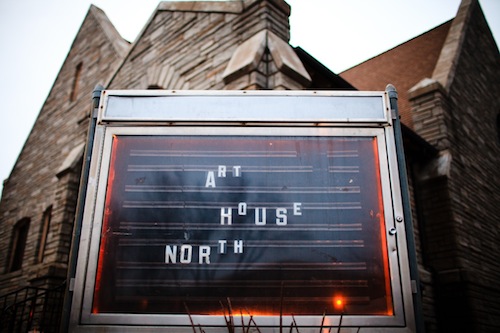 Photo: Justin Mark Vagle | www.justinmarkphotography.com
Photo: Justin Mark Vagle | www.justinmarkphotography.com
On a Thursday night, I pull up to the front of the dormitory where Elena is waiting for me. She has no car at her disposal, so I’m her ride. It’s mid-February, another overcast day, a month where we find ourselves in the depressive, gray muddle of late winter, our blanched skin beginning to itch for spring. Elena is an English-Writing major, one of my best, preparing to graduate in May from the college where I’ve taught writing for almost as long as she’s been alive. We’re on our way to the inaugural gathering at Art House North where Elena interned last fall.
 Photo: Justin Mark Vagle | www.justinmarkphotography.com
Photo: Justin Mark Vagle | www.justinmarkphotography.com
About twenty minutes later, we walk up the steps into the small church thronged with people, creatives of every kind — such a different scene from that ninety-degree September afternoon five months ago when Elena and I sat with Troy and Sara Groves in this space, listening to their luminous vision and need amid stagnant air and heat. This night is the first step toward articulating that vision of creating a gathering space for artists in the Minneapolis/St. Paul area, inviting them into significant conversations about God, creativity, and the common good.
 Photo: Justin Mark Vagle | www.justinmarkphotography.com
Photo: Justin Mark Vagle | www.justinmarkphotography.com
So we enter the swim of people, words, laughter, a table laden with desserts, the dusky scent of coffee steaming from the cup in my hand as familiar faces sift through the crowd. And amid the lovely clamor, I’m reminded that what we’re experiencing is something artists desperately need — this coming together, this connection. All art is a conversation. The artist of faith negotiates a rich and multifaceted dialogue with God, the work, and community. Still, even amid this need, most art is created in separateness and seclusion, and to some degree, isolation can be too much a hallmark of the journey. I picture my moments huddled over words: alone at the laptop, on the couch, at a coffee shop table layered with white pages.
 Photo: Justin Mark Vagle | www.justinmarkphotography.com
Photo: Justin Mark Vagle | www.justinmarkphotography.com
Eventually, we are gathered in dark wooden pews while Troy and Sara talk about the call that led them to purchase an old church and begin Art House North: years of prayer, work, and shifts for their family. Sara gazes at the packed room, this first embodiment of the vision, and tears up. Charlie Peacock and Andi Ashworth tell the story of their journey with the Nashville Art House. Charlie plays a blues tune, and Sara sings about beauty. The deep sense of goodwill in the room is almost excruciating. I hear expansive words like hospitality, community, and artful living. But maybe the most important thing is the most elemental — that we are all here together, thoughtful creatives listening and dreaming. The winter has been long, and we are hungry for every bit of this night.
 Photo: Justin Mark Vagle | www.justinmarkphotography.com
Photo: Justin Mark Vagle | www.justinmarkphotography.com
Today, Minnesota is edging toward spring — sun and melt, new warmth rimming the cold — and I’m pondering that February gathering and how our coming together created a bigger space to breathe, a space where creative living was celebrated as part of what it means to be made in God’s image, beauty recognized as integral to life in God’s kingdom. And I’m glad that Elena was there, a young writer just beginning to explore her talents. I asked for her reflections on that night, and she said, “I felt like I was shown a picture of how the world should be, and when I left, the world was a much fuller, richer, a more beautiful place than when I came, because it was allowed to be so.”
 Photo: Justin Mark Vagle | www.justinmarkphotography.com
Photo: Justin Mark Vagle | www.justinmarkphotography.com
Where will the journey of Art House North lead? It’s hard to say. What I know for certain is that good conversation leads to community, and creative communities, especially those rooted in God, have transformational power. I’m reminded of a quotation I love from anthropologist Margaret Mead: “Never doubt that a small group of thoughtful, committed citizens can change the world. Indeed, it is the only thing that ever has.” And I think about her words, picturing that little church in St. Paul that night as if from outer space, old brick and wood, all those hopeful people inside, a buttery light emanating from the windows. One building in one neighborhood in one city, a seed and a sign of God’s restorative work in the world and for the sake of the world, where young ones and old ones, musicians, writers, painters, dancers — artists of every stripe — understand the power and the goodness in the gathering.
Judith Hougen is the author of a collection of poetry (The Second Thing I Remember) and a spiritual formation book (Transformed into Fire). She teaches writing at Northwestern College in St. Paul, Minnesota, and blogs about spirituality and writing at Coracle Journeys.














